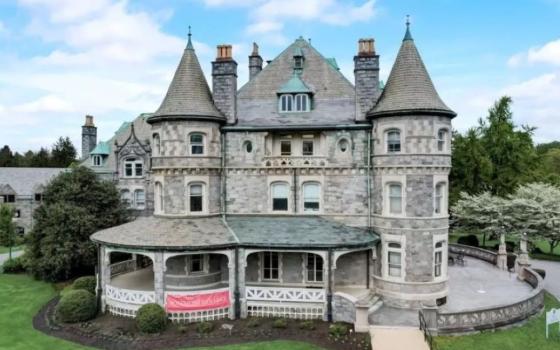
A modern view of Wielun, Poland. Germany bombed the city on Sept. 1, 1939, an attack that sparked the Second World War. (Wikimedia Commons/Piotr Torchała)
The German and Polish Catholic bishops' conferences released a joint statement urging further efforts at world peace and increased reconciliation between Germany and Poland for the 80th anniversary of the outbreak of World War II.
"The present generation in Poland and Germany — indeed throughout all Europe — can experience many changes for the better 80 years after the beginning of the war," read the statement, signed by the presidents of both bishops' conferences, German Cardinal Reinhard Marx of Munich-Freising and Polish Archbishop Stanislaw Gadecki of Poznan.
"However, we are aware that the fruits of reconciliation must be treated responsibly; they must not be abandoned recklessly for political interest. Therefore we demand in this special moment in history that our relationships are never again marked by violence, mutual mistrust or injustice," they said.
The bishops recalled the beginning of the war in the small southwestern city of Wielun, Poland, which sparked the violent global conflict that shook the world from 1939 to 1945.
The German attack began before dawn on the morning of Friday, Sept. 1, 1939. Wielun, a scenic community with a rich medieval history, contained neither military targets nor soldiers to defend it. Attacking almost in unison with a German ship invading Poland's Westerplatte peninsula, a squadron of about 30 Stuka bombers opened fire on Wielun at about 4:40 a.m.
The air raid killed more than 1,000 civilians, including 26 patients at a hospital that was destroyed by bombs. The city center, including the local Catholic parish, was reduced to rubble.
"Thus Poland became the first victim of the Second World War," recalled the bishops, adding that the violence marked the beginning of a long Nazi occupation, "accompanied by countless atrocities and the destructive politics abolishing the Polish nation, especially the Jewish population."
The bishops memorialized Polish war victims as well as Jewish victims of the Holocaust.
"On the 80th anniversary of the beginning of the war, we remember 6 million Poles, including 3 million Jews, who became victims of the criminal Nazi system," they said in their statement. "We are aware of the pain that the victims and their relatives have suffered, which is still felt today."
They also recalled the displacement of millions of Poles and Germans at different points during the war, people who were forcefully driven from homes in Polish territory to seek new countries and places of residence.
Advertisement
Relations between Poland and Germany were bitter after the war. However, an unexpected change occurred between Polish and German Catholics in 1962, when Poland's bishops sent a letter to the German bishops, recalling the terrible events of the war and offering to begin a reconciliation process.
"Their appeal, especially known for its words 'We forgive and ask for forgiveness,' opened a new chapter in the relationship between our peoples. ... The German bishops accepted [the Polish bishops'] outstretched hand with gratitude."
Today, 57 years later, the bishops' conferences communicate regularly and have established a contact group that meets to promote cooperation and healing.
In their statement, the German and Polish bishops called attention to the fact that the reconciliation process is not over.
"In order to overcome this injury and the painful memories associated with it, we must all earnestly take part in the process of reconciliation between our nations," they stated.
Despite historical and cultural differences between states and nations in Europe, which still exist today, the bishops called upon present generations to "strengthen and deepen the unity of Europe, which is founded on Christian principles."
"From our shared memory of the past burdened with violence and injustice, yet also from our memory of the encouraging witnesses of humanity, we appeal to everyone to create strength and inspiration for further shared endeavors for peace and unity."
[Zita Ballinger Fletcher has reported extensively on Germany's Catholic Church for Catholic News Service.]







